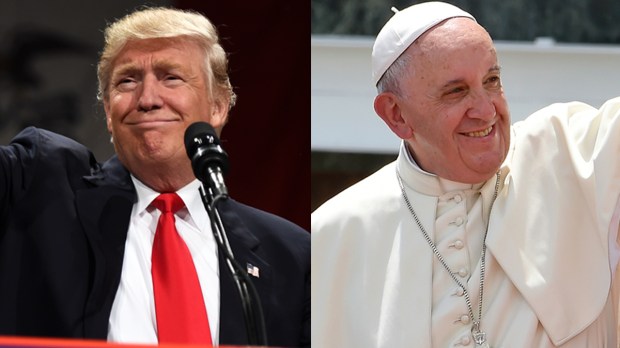What will it be like having Trump as a president? Some Catholic critics have been tempted to say, “We know what it’s like, because we have Francis as Pope.”
They have a point. At first glance there is a lot to compare between the two leaders
First, you can compare their impromptu speaking styles.
Trump is a head of state who talks off the cuff, uses colorful colloquial language and freely speaks his mind, letting the chips fall where they may. Just like Pope Francis.
In homilies and press conferences, Francis is also an unpredictable font of sometimes charming, sometimes maddening, unscripted words. Like Trump, he even goes for laughs. Brendan Michael Dougherty noticed it early on and dubbed him “Pope Francis, insult comic.” Like Trump, Pope Francis has been criticized when his observations got too personal — and Francis has himself admitted that he is personally tempted by the “dark joy” of gossip.
Second, you can compare their approach to management.
Both leaders can cause headaches to their staffs. Trump surprises his staff with tweets. Francis surprises us all when he speaks on airplanes. Francis subverts papal protocol by making surprise phone contact with Catholics worldwide. Trump subverted diplomacy with his surprise phone contact with Taiwan.
But more than that: Both are very free with critical assessments of those who work for or with them. Trump critics on the left and right say that Trump’s allies fear that Trump will not “have their back” if anything goes wrong. They have good reason to worry: Trump has a history of harshly criticizing Republicans and famously dropped Chris Christie and friends from his transition team.
Pope Francis also has a reputation for being critical of would-be allies. For example, he has turned an annual December speech to curial staff into a forum on their faults. Careful critic Father Raymond de Souza sees lots of reasons to be thankful for Pope Francis. Nonetheless, he sees even more acrimony ahead regarding Pope Francis’s postsynodal apostolic exhortation Amoris Laetitia, precisely because of the disagreements Francis has had with Synod fathers.
A third similarity: They both know how to speak in pictures.
Trump didn’t just win campaign polls; he staged giant rallies that showed his popularity. He didn’t just preach populism, he made a red “trucker’s hat” his signature look. He doesn’t just claim to be tough — he made a squinting “tough-guy” expression his “brand” on everything from his book covers to his campaign posters.
Pope Francis also “branded” himself by his appearance, skipping the more ornate papal regalia for a simpler look. And Francis doesn’t just say confession is important, he goes to confession in full view of the cameras. He doesn’t just speak of the importance of service, he invites the homeless to the Vatican. He doesn’t just say to “go to the peripheries,” he washes the feet of juvenile delinquents in prison.
The visuals start to hint at the differences: Trump made headlines by his graphic description of how easy it is for celebrities like him to get sexual partners. Pope Francis, on the other hand, recently made headlines by visiting former prostitutes and apologizing on behalf of their Christian and Catholic customers.
But the difference goes even deeper than their personal character.
Many of us continue to make the same mistake Christians have been making for millennia: We consider political power, and not religious truth, the most important force on earth.
Politicizing the faith is at the root of the Church’s worst sins ever: Judas betrayed Jesus the suffering savior because he had wanted Christ the conquering victor. Imperial disputes between East and West fueled the Great Schism. Reformation figures objected to the overly political Roman Church and ironically led to a fractured landscape of state churches.
Today we too often look at the Church as a struggle between left and right, and we invest a lot of energy into trying to determine which side is winning.
If we judge the Church – and the pope – in political terms, we not only risk doing harm to the unity of the Church; we risk missing the point of the Church altogether.
As my friend Dr. Edward Mulholland said, at some point we have to stop the endless analysis of the pope and simply “Let him Pope you.” For instance, when the pope criticized the curia, the Harvard Business Review featured his critique as something business leaders everywhere can learn from.
Perhaps Catholics should do the same more often: Look through the pope’s words not for what offends us, but for what convicts and inspires us.

